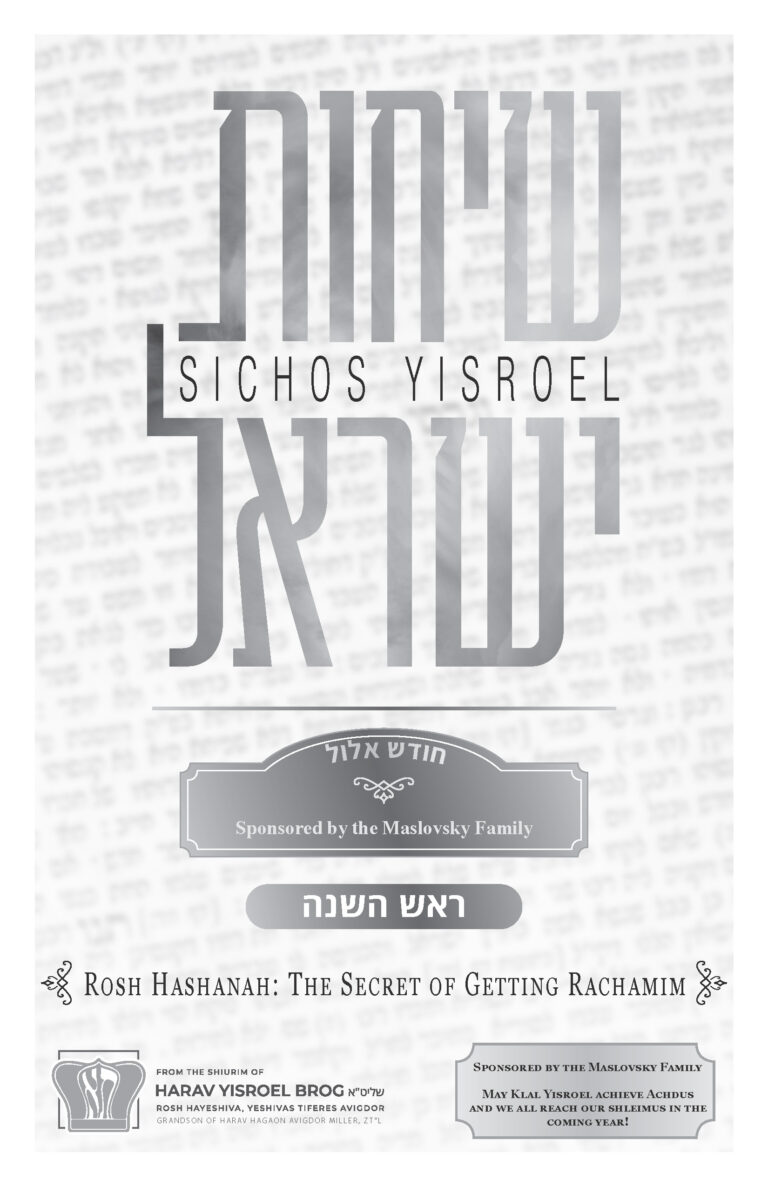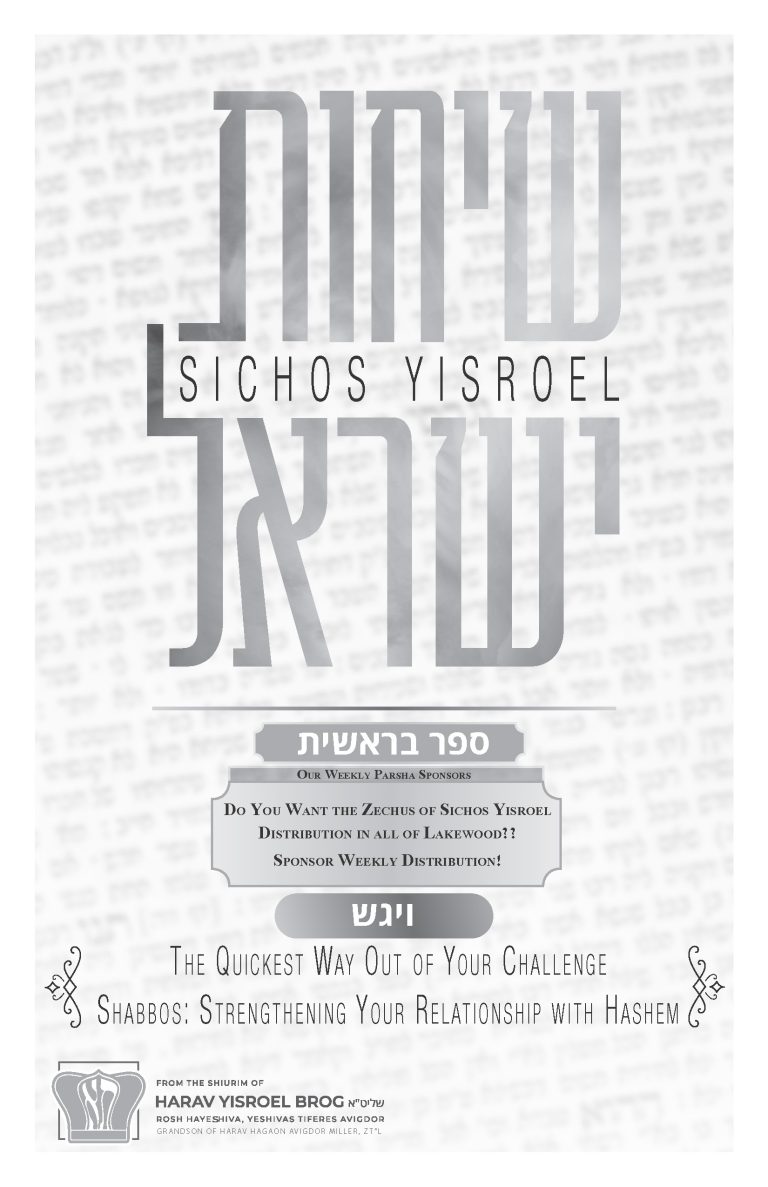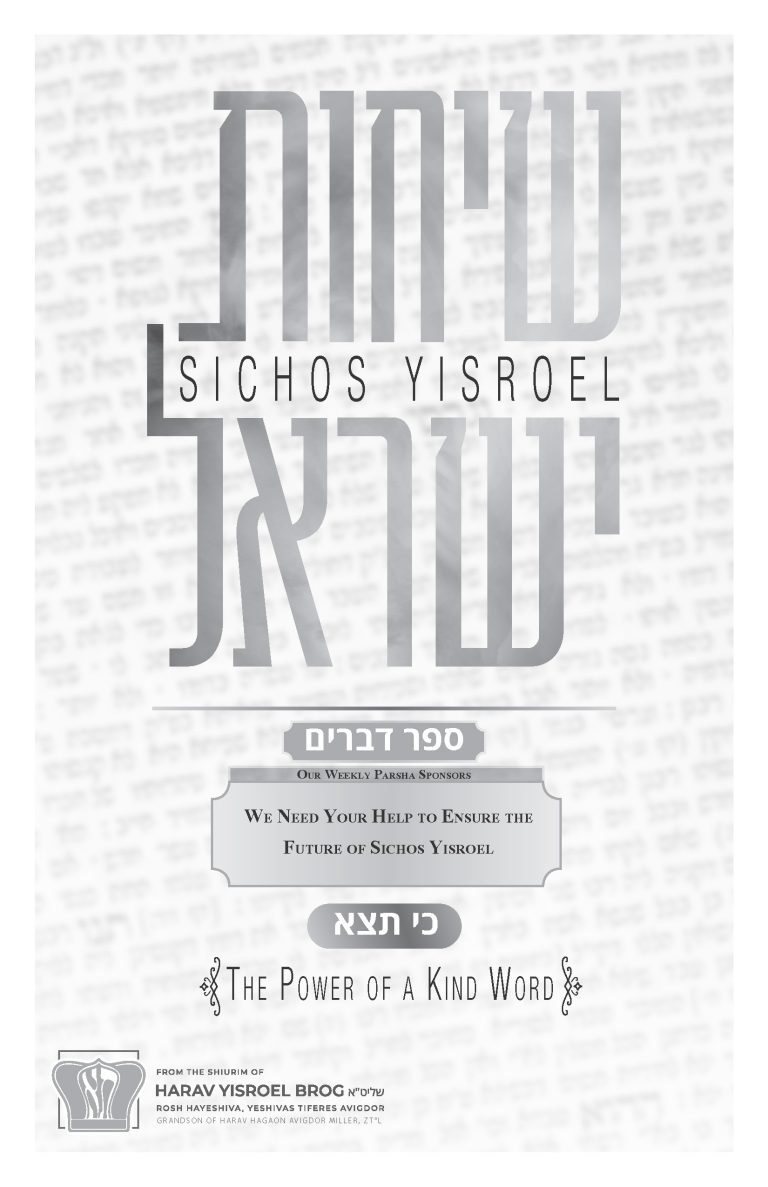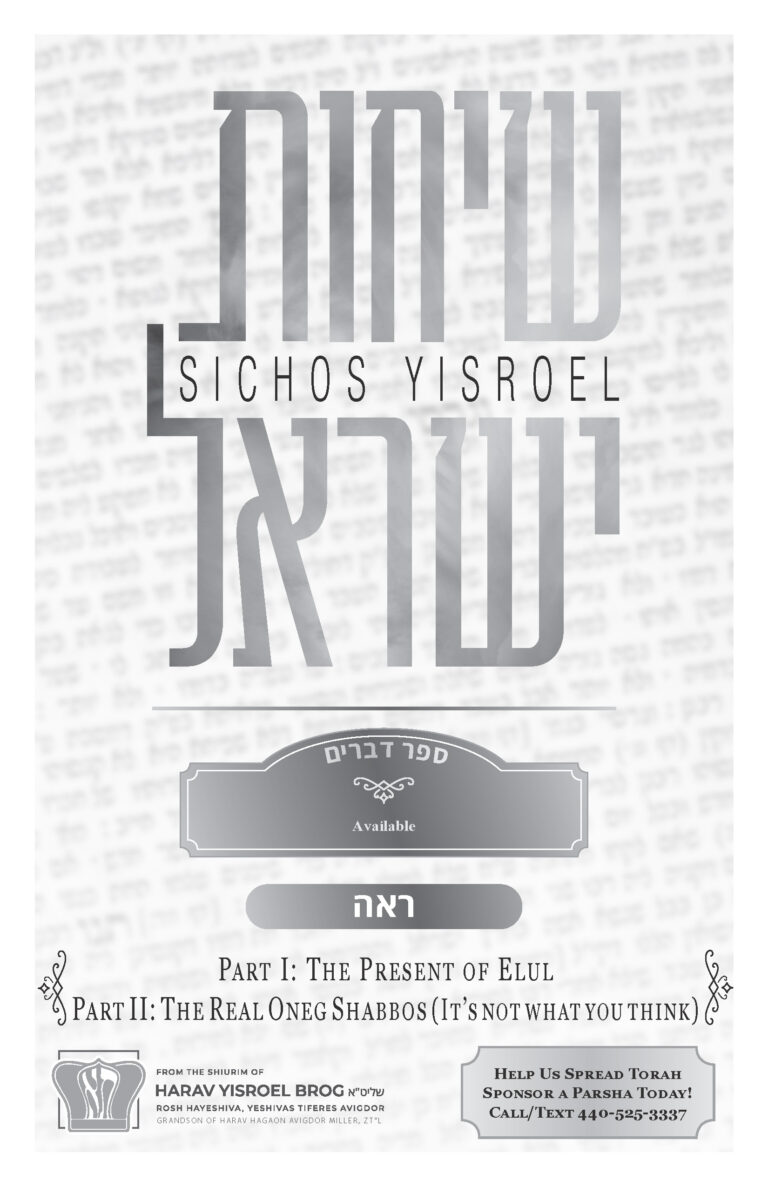Balak 5782 – What The Focus of Chinuch Should Be
In Honor of the
Neiman-Shulman
Shabbos Sheva Brochos
Consider sponsoring a shiur
Visit YTATorah.org
Shiur presented in 5779
Parshas Balak: What to Focus on in Chinuch – Part 1 (5779)
Defining True Success
Our parshah depicts a well-known historical figure who represented ideals that weren’t nice. Bilam is considered the father of all bad middos and he’s the counterweight to the father of all good middos, Avraham Avinu. There’s a mishnah in Avos where our Tana’im make this contrast.
Now, this contrast is such an insightful piece of information, it’s worth studying it over and over. At different junctures in our lives, we have thoughts of wanting to shteig. You go to your therapist and he tells you, “The first thing we’re going to work on is your self-esteem.” It’s very common. “We’re going to work on your confidence,” he tells you.
So you listen to this nonsense and you begin to think that the yesodos hachaim – the key to all success – is being confident, being ambitious, and having a good self-esteem. The problem is that you don’t find this anywhere in the Torah. What middos are the keys to a successful life? Not that self esteem is a negative thing.
Here’s a parent who decides they are having children. Sometimes, in the beginning, when you have children, you think how you’d like to raise them to be erliche Yidden: “I want them to grow up and be erlich.” How do you do that? You teach them to be clean? Is it by giving them baths every day and teaching them the importance of good hygiene? That’s what some people think. Many mothers think that good middos means teaching your children not to point at others. Or another good middah is to teach them to say “please” and “thank you,” and if you do that, your kid will grow up to be a wonderful nice erliche Yid.
I’ve got some news for you. In the worst homes, in the homes of the biggest reshaim in the world, they say “please” and they say “thank you.” They may even say “yes sir, no sir, yes ma’am, no ma’am.” They have very fancy shmancy etiquette, but they’re still the worst of the reshaim. Saying “thank you” doesn’t make you a mentsch. So what are the keys to success that you want to develop in yourself and your children? How do you build talmidim? This is a very important question. What does it take to build talmidim? To build children?
The Three Foundational Principles
If somebody came and asked you this question, what would you say? Are you planning on being a father someday? Hopefully. If a person is going to ask you, “How do you want to raise your kids?” You might say Sefardic, not Sefardic, maybe Chassidish, maybe Litvish, maybe Heimishe, maybe Tuna Beigel, whatever it is out there. What do you want? Modern, not this, not that – nonsense. Shtusim and hevalim. That doesn’t do anything. That doesn’t create anything. What does it take to make somebody? What are the most important key middos to work on?
Chazal tell us כל מי שיש בידו שלשה דברים הללו, any person who has these three middos (you have to aspire to have all three middos), מתלמידיו של אברהם אבינו עליו השלום – he’s considered to be a one of the talmidim of Avraham Avinu (Avos 5:19). You hear that? It’s unbelievable. Three things. That’s it. עין טובה רוח נמוכה ונפש שפלה – a good eye, a humble spirit and a satisfied soul. And if you have an עין רעה רוח גבוה נפש רחבה – an evil eye, an arrogant spirit and a greedy soul, then you’re מתלמידיו של בלעם הרשע – you are from the talmidim of Bilam.
Now, most people, once in a while, think: “I’d like to improve.” You know what they say? “I’ll improve my Torah learning,” or “I’ll improve my clothing.” I’ll improve this. I’ll improve that. No. You want to improve your foundation first. The foundation is what everything is built on. So let’s take a look at some of the foundational attributes.
The Root Cause of Bilam’s Depravity
You should know that Bilam Harasha was not stupid. He was brilliant. He was a genius. Chazal tell us he was as smart as the rebbi of Dovid Hamelech, Achitofel. In some ways he was as great as Moshe Rabeinu in his awareness of Hashem. His intellect was tremendously superior. Yet, he was the most depraved animal that existed upon the earth due to his middos, his immorality. He was ruined beyond ruined. You know why? Because of his middos.
Chazal tell us that these three bad middos destroyed him completely. It wasn’t that he was too smart so he figured out questions and that led him to challenge Hashem – like many people think. It’s all about bad middos. When we look at a rasha, a fellow who is engaged in depraved behavior, you know what we say? “Ah, it’s yetzer hara, yetzer hara, yetzer hara.” People use all kinds of different languages. No, my friends. Do you know what it is? Bad middos.
I was speaking to somebody today, about whom I heard something bad. I told this person, “I don’t want to believe this about you. Somebody said this and this about you. Is there any truth to it?” The person said, “Absolutely not!” The person said, “Do you really think I could do such a thing?” I said, “Listen, you’re on a slippery slope and when you’re on a slippery slope, people do a lot of stupid things. Be careful.” People like to say all kinds of reasons why people misbehave. Why does a person’s yetzer hara drive him to ta’avah? You know what we think? “I just have a big yetzer hara.” No, you have bad middos. That’s the key!
Seeing With a ‘Good Eye’
Now, let’s examine the first good middah of Avraham Avinu. He had an ayin tovah. Now what does an ayin tovah mean? An ayin tovah doesn’t mean that you believe in an ayin tovah. It says כל מי שיש בו. That means to say he has to have in his being an ayin tovah. What is an ayin tovah? So the Rishonim explain that this describes a person who is content with what Hashem has given him. He looks good positively upon what Hashem has given him.
Now, that’s a very tall order for people, because most people are far from content regarding their financial circumstances, for example. They desire more. They’re jealous of others. They feel that they davened and had bitachon and Hashem gypped them. Avraham had an ayin tovah. He was so happy with what he had that even when he won the war against the five kings, he refused to accept any of the spoils of the war even though taking the spoils was a completely accepted practice. The king of Sodom said, “Listen, you deserve it. You’re entitled to it. You fought. You won fair and square. You deserve to have all this money.” You know what Avrahaam Avinu said? “I want nothing from you. I’m not going to take as much as a shoelace or a thread.”
Now, there are many people who never feel that they got a fair shake. They never feel that Hashem took care of them properly. They tried this job. They tried that job. They studied. They took courses. They did this and that. And they are willing to work! All kinds of stories. But they can’t seem to get ahead. You should know that they don’t have an ayin tovah. Their ayin ra’ah makes them miserable. They’re always looking at what others have and saying, “Why does that bum have more than me? I’m more erlich than him.” The only thing that you lack is ayin tovah. That’s a very big strike against you. You have to know that.
Every person should ask himself whether he’s working on being happy with what he has. What makes a person happy with what he has? A person says, “How should I be happy?” He should know that whatever Hashem does is for the best. Your problem is that you don’t accept Hashem’s control of the world and you don’t accept what Hashem metes out for you. Many people grew up all their lives always feeling they were always behind everybody else. They were always on the bottom. They lack that middah of ayin tovah. If you’ll ask them about it, you know what they’ll tell you? “You want to hear what kind of tzaros I had in my life? You want to know how unfair my life was?” Sometimes they hear about somebody else who also had a bad life but he ended up becoming wealthy, so they say, “Nu, mimeilah that guy ended up becoming wealthy. But I didn’t make it.”
Ayin tovah is one of the foundations of life. If you want to train your kid to be an erliche Yid, train him to have an ayin tovah. Tell them, “No matter what you have, and no matter what you don’t have – it’s all from Hashem, and if it’s from Hashem, that is exactly what you are supposed to have.” How many children don’t have parents? That is a great challenge for a child. Why am I different? What do you tell a child like that?
A Personal Chavrusa with Rashi
I was just speaking to a person whose spouse is in the process of struggling with a very terrible illness. It’s very hard for people to understand and accept that this is for the good. You can’t understand that. I just read a story about how in the year תשל”ג) 1973) there was a yeshivah in Yerushalayim that went up to Meiron. The driver lost control and the truck fell down a hill, turned over a number of times and three bachurim died. It was a tragedy of tragedies. They were good bachurim. They were be’emes good bachurim. And there was one bachur in the yeshivah who was particularly close to one of these bachurim, and he couldn’t come to terms with it. One night his friend came to him in a chalom and he said to him, “Stop. Don’t feel bad for me. I am in a tremendous place. I came up and I went straight to Gan Eden.” He said to him the following. “You know who I’m learning with bechavrusa over here? I’m learning bechavrusa with Rashi. Do you remember how I spent the whole Friday learning Chumash and Rashi, every Rashi on the parshah no matter what, no matter when, no matter how? The appreciation and the sechar they gave me is that I get to learn with Rashi himself.”
So his friend asked him, “What do you mean? You didn’t have a din? There was no din?!” He said, “Do you know why? I’ll tell you why. You know why we died? I’m going to tell you why. Klal Yisrael was facing an awful gezeirah, and many, many Yidden were supposed to die. Hashem took three korbanos instead. We were those korbanos. When you die under such circumstances you pass over the din.”
Most people think they are going to get married and have children, and have this or have that. A person has to have an ayin tovah to know that whatever Hakadosh Baruch Hu does is for the good. It’s very hard to see.
Generosity of Spirit
Another aspect of ayin tovah is not only about being content and happy with what one has, but it is also about having a generosity of spirit, about being kind and generous, and wanting the best for others. It’s very interesting to note that Rabeinu Yonah writes where we see Avraham’s ayin tovah toward his fellow man. Do you know what he says? A strange thing. The passuk says the following about Avraham: ויקח בן בקר רך וטוב – he sought out a calf soft and good. We know about the ayin tovah of Avraham from this passuk. Why don’t we learn about Avraham’s ayin tovah from all the inns that he built all over the country? He established inns for wayfarers. He gave them achilah shtiah linah. Isn’t that amazing? Why would Rabeinu Yonah choose this specific passuk about the calf?
And the answer is that Avraham’s choice of establishing inns definitely testifies to his middah of chessed, but his ayin tovah you see from the ויקח בן בקר רך וטוב. Here’s a fellow who invites somebody into his house and the guy looks like a schlepper deluxe. The host feels like he’s a groise tzaddik: “I’m inviting him in and I’m giving him food to eat.” He looks in the refrigerator and he sees that today was his lucky night. His wife prepared for him something very special. He always says to his wife: “Why don’t you prepare something special? Show me a shtickel of your ayin tovah.” And his wife prepared something very special. He looks at it. Mamash, punkt his dream. He feels it with his finger, it’s soft and still warm. And his wife leaves him a note on the refrigerator: “My dear husband, I made you your favorite, favorite. You know that piece of meat we got recently, the one piece of meat we got that I saved for you? I cooked it tonight. I prepared it exactly how you like it.” Next to it there’s supper for the regular family – hamburgers, whatever it is. So the guy reaches into his refrigerator and he says to himself, “This guest looks like he would enjoy this meat. He would enjoy this meal more than me or as much as me.” He takes it out and he gives it to him.
So here’s Avraham who is hosting the three guys. He thought they were Arabs. He could have given them anything to eat, but he picked out the בן בקר רך וטוב. He could have given them other בקר. Somebody’s gotta eat that, right? “No, I’m giving them the בן בקר רך וטוב.”
A “Candy” Test
Ayin tovah doesn’t just mean to be kind to somebody. The way Avraham served those calf tongues to them was an amazing zach. He served it in an amazing way, in an amazing fashion. A person has to know that the middah of ayin tovah is how you build a Jewish child. A child has to be trained in this. Here is a child who has a candy. You could see who has an ayin tovah. I like to always test children by asking them if I can have a piece of their candy. What I find the biggest chiddush is that, even if you give them the candy and then you ask them, “Can I have a piece?” many of them either run away or shrug their shoulders, even though they understand. Where is your seichel? It’s my candy! I just gave you this candy. Give me a piece. Or the kind ones give you aza brekle (tiny piece), a mashehu. It’s barely between their little tiny fingers and they give it to you. I tell them, “No, that you take it. Give me the other one.” Then they run away. They get angry. Sometimes they even cry because they understand the message. Some say, “It’s mine!” I even had kids on rare occasions give it back to me, the whole candy, and they say to me, “Are you going to give it back to me?” They know already I’m testing them.
How to Work on Ayin Tovah
A person has to know that there’s an ayin tovah. An ayin tovah means you have a good eye for yenem. I want yenem to have the tov beshleimus. A person should say, “It makes me so happy to make somebody else feel good.” That’s the middah of ayin tovah, and it’s something that a person has to work on.
I’ll tell you how you work on it. Sometimes you have something that you consider special, your favorite type of food, your favorite type of nosh and you don’t have enough of it. You think to yourself, “You know what? I think maybe my spouse would enjoy this.” I was in contact with spouses who told me they hide in their drawer their very good chocolate, their Swiss chocolate. Schmerling chocolate. Or somebody gives them a present of Belgian chocolates. The first thing they do is they hide it somewhere. Sometimes the husband will hide it from the wife and sometimes the wife will hide it from the husband. Or let’s say somebody went out and bought themselves a nice soft ice cream. Sometimes you have a person who will buy for himself and for his spouse. A nice person. That’s ayin tovah. An ayin ra says, “Let me eat this ice cream before I get home so then my wife doesn’t have to get one.” Or the wife says, “I’ll eat it before I get home so my husband doesn’t have to get one.” Believe me, your kids will develop these middos par excellence. This is how you develop a Bilam. This is making yourself and your child a talmid of Bilam Harasha.
Now, of course, it all starts with sharing, but what you have to do is you have to say, “Hineni muchan umezuman – Hashem I want to break myself.” I know that I have something put away. I know it’s in my refrigerator or my freezer. Somebody comes, a meshulach comes or somebody we don’t think is that important. You say to them, “Would you like some of this?” You offer it to him. A person goes out to eat, and he takes a friend out to eat with him. He knows there’s very good food in this place, but each plate costs $100 for the real good stuff. He likes to have it when he treats himself, but he’s not going to buy it for somebody else. I know a very nice fellow whose wife likes to go out to eat and enjoy herself. He told me he has a hard time because his wife likes to order the real good stuff. What does he end up doing? He ends up ordering one portion and sharing it.
A person has to understand this is what’s called an ayin tovah. I want the tovah of yenem beshleimus. This is one of the tremendous foundations of Avraham Avinu’s greatness.
Opportunities to Become Talmidim of Avraham
I’m only touching on this sugya today. There are two other middos that are fundamental but this is something to start working on. Today or tomorrow, or whenever you get a chance, if you have something and you could demonstrate an ayin tovah for someone by offering sincerely to share what you have, a davar tov meod and you want the other person’s good, then you’ll be starting to build yourself into a talmid of Avraham Avinu. Many of us don’t like to face the emes that we’re lacking this middah. We’re not really holding there. We’re closer to the talmid of Bilam Harasha than we are to the talmid of Avraham Avinu. And it doesn’t make a difference, as you could be a big tzaddik, or a big talmid chacham and still be a talmid of Bilam Harasha.
There was once a fellow who my brother was very impressed with, a very choshuv bochur, and he wanted him for my sister for a shidduch. So he red the shidduch. I wasn’t in the country at the time. When I heard about it, I was up in arms. I called up my father. I said, “Cancel that shidduch on the spot – he’s מתלמידיו של בלעם הרשע.” He said, “What are you talking about?! This guy is unbelievable!?” I said, “I’m telling you he’s מתלמידיו של בלעם הרשע. Forget about an ayin tovah. He doesn’t have an ayin tovah. The guy is not going to be able to share a thing with his wife. Learning, I’m not saying he’s matzliach in, but if you want a husband for your daughter, you need someone with an ayin tovah, and this person just doesn’t have it.” Baruch Hashem, the date lasted only a half hour. He didn’t say anything, so my sister said to him, “Would you like to go now.” He said, “I guess.” It was over. Baruch Hashem. But I remember he looked like such a tzaddik.
Rabbosai, this is step number one. Very bad middos develop when a person wants things for himself. He has an ayin ra’ah and so it doesn’t stop. You end up wanting what Bilam wanted. Hakadosh Baruch Hu should help us develop a shtickele ayin tovah in ourselves and in our children.






